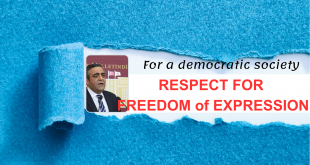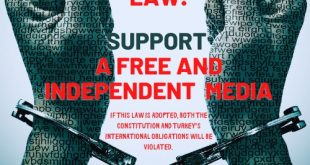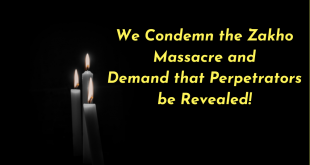Human rights organizations at national and international level, academics and even the public institutions and governmental organs have publicly criticised, refrained from supporting and declared inadmissibility of the draft Law on Human Rights Institution of Turkey (national human rights institution). Despite this fact, the draft law was brought on the agenda of the parliament and this is not legitimate by any means.
23 March 2012
JOINT STATEMENT
The draft Law on Human Rights Institution of Turkey was on the agenda of the Parliament during the previous legislative period and annulled due to the general elections of 12th of June 2011. However, the Council of Ministers submitted this draft to the Parliament on 5th of March 2012, which referred it to the relevant Parliamentary Commissions on 15th of March 2012.
Human rights organizations at national and international level, academicians, lawyers and even the public institutions and governmental organs have publicly criticised and objected to the draft law. Indeed, these criticisms were repeated once again at “an international official meeting” few months ago. However, the government submitted this draft to the Parliament again, without making any changes and even by ignoring small positive changes they brought during the previous legislative period. We are confused and seriously concerned about this development, which is an important indicator of the government’s approach to democracy, participatory processes and respect to human rights.
Establishment of a “National Human Rights Institution” in line with Paris Principles is an obligation of Turkey which cannot be avoided.
In fact, the discussions on establishment of a national human rights institution in line with Paris Principles in Turkey have been on the agenda of the people and organizations working in the field of human rights as well as the government since 2004.
Establishment of such an institution, which has a potential of making significant contributions to the democratisation of Turkey by preventing human rights violations and strengthening the respect for human rights, is not only a recommendation of United Nations documents but also a “homework” that Turkey has to fulfil as defined in “Accession Partnership Document” and “Progress Reports” produced for Turkey’s accession to the EU membership.
Despite the fact that national human rights institutions are established with law, it is the letter and spirit of Paris Principles that these institutions are independent of other state organisations and political power. The need for establishment of national human rights institutions arises from a simple contradiction, which is “potential human rights violators cannot be protector of these rights at the same time.” It is a universally known fact that the biggest human rights violators are the states and governments. Therefore, an institution established for preventing human rights violations and for protecting these rights has to have an organisational model that is absolutely independent of government hierarchy and that can monitor and control the government independently.
Another point that constructs the spirit of Paris Principles is that the establishment process of a national human rights institution is to be open to the pluralist representation and participation of social forces of civil society which are active in strengthening and protection of human rights in the country. In short, this process must be transparent, participatory and democratic.
The story of Draft Law on Human Rights Institution of Turkey:
Unfortunately, the process of development of the Draft has been carried out in a manner which is contrary to the spirit of Paris Principles since 2004. The law drafts prepared by government are always in the manner of fait accompli. These drafts have been either kept secret or shared with the public and relevant organizations at the last minute. The drafts have generally been produced without taking the opinion of human rights organisation and civil society. Where their opinions have been asked, the criticisms and suggestions made by the civil society have never been taken into consideration or any changes related to the spirit of the draft have not been made.
The 60th government announced that it prepared a draft law on national human rights institution in May 2009, but the human rights organisations could not see the content of the draft until 28th January 2010 when it was submitted to Presidency of the Parliament.
On the other hand, when the draft was on the agenda of the Constitution Commission of the Parliament, 16 different organisations (about one third of which were ministries and relevant governmental organs) were invited to submit their opinions to the Commission. Almost of the civil society organisations heard at the Commission declared that the draft law had failed to secure the independency and pluralism of the National Human Rights Institution. The Constitution Committee ignored these objections and criticisms and made a couple of formal amendments in the draft.
However, we would like to emphasize that we recognise the valuable role of the commission in listening to the opinions of the civil society and making small amendments to the draft.
The Commission accepted the draft and referred it to the General Assembly of the Parliament on 13th of January 2011. Nevertheless the draft could not be discussed at the Parliament because it was annulled due to the general elections of 12th of June 2011.
At this current stage, the government submitted the initial draft to the Parliament on 5th of March 2012, without even showing respect to a couple of positive amendments that were bought into the text by former parliamentarians at the sub-commission of the Constitutional Commission and the commission itself. This attitude of the government, which ignores the proposals and criticisms of the civil society and even the contribution of former parliaments, raises concerns over the democracy in the country. Leaving all other criticisms aside, this attitude alone eliminates the legitimacy of the Draft.
The Draft Law on Human Rights Institution of Turkey cannot be adopted as such because:
- The draft has been prepared without taking the principles of participation, comprehensiveness and transparency into account in a way against the international criteria.
- A state-centred approach is predominant in the draft rather than an individual/citizen centred approach.
- National Human Rights Institution as proposed in the draft law is designed as a government agency similar to the existing human rights bodies.
- National Human Rights Institution is designed as a presidency mechanism similar to all previous human rights bodies. There is almost no option for the institution to work against the will of its president.
- The members are appointed by the government and no objective membership criteria have been defined.
- The Draft does not sufficiently secure the independency and impartiality of its members and it does not ensure especially the financial independency of the institution. The institution must have its own independent budget line and most of its budget should be allocated from the general budget with the approval of the Parliament.
- According to the draft, the structure and number of personnel is subject to the General Personnel and Recruitment Law no. 190 Cadre and this structure will negatively affect the independency of the institution.
- The draft does not secure the pluralistic representation and participation of the board members.
These remarks, which have been expressed repeatedly by all right-based civil society organisations, have also been repeated by particularly UN International Coordination Committee Sub-Committee on Accreditation (ICC SCA) related to National Human Rights Institutions and by the EU experts issue. Moreover these organisations and experts have stated that the national human rights institution established with this draft could not take Status A in terms of Paris Principles and therefore this draft should have been withdrawn and a new draft should have been prepared in a participative manner.
Similar criticisms are also placed in the report prepared by the experts from EU who visited our country on 17-21 January 2011 within the scope of 23rd section of EU Accession Partnership Document by making interviews the representatives of relevant public and civil society organisations. It is stated in this report that basic feature of human rights mechanism established in line with Paris Principles is its de facto and de jure independence and that none of the existing human rights institutions in Turkey conduct independent monitoring. The report also remarks that the government should not be represented in decision-making mechanisms within the national human rights institution and they must not have right to vote; if the government should be represented in the institution against all odds, then these representatives should only have a consulting role. In addition, the report clearly states that a new draft law must be prepared as the existing draft does not bring in an independent mechanism.
Interestingly and surprisingly enough, all of these remarks have been extensively discussed at the TAIEX Political Criteria meeting on “National Human Rights Institutions” held by European Union in Ankara on 19-20 December 2011. As it is understood from the organizing bodies and its title this seminar was meeting necessarily hold as a requirement of EU harmonisation process and its participant profile was as broad as possible. International experts and ministry authorities as well as the representatives of the other relevant public bodies and civil society organisations and academicians participated in the seminar and many of the participants agreed on that a new Draft should be prepared.
Draft Law On National Human Rights Institution does not allow establishment of an independent, functional and effective preventive mechanism as foreseen in UN Optional Convention Against Torture because “national preventive mechanism” that should be independent according to the Optional Protocol is defined as a sub-unit of National Human Rights Institution according to the draft law. This also means that the process of establishment of a “national preventive mechanism” would not comprehensive and transparent.
Besides, the draft law does not define detailed regulations that would ensure that the preventive mechanism performs the prevention task actively and effectively.
In addition to that, it is actually impossible that the National Human Rights Institution with its limited number of staff as defined by the draft can effectively prevent torture. The independent preventive mechanism that will be given the task of preventing torture and ill-treatment has to monitor not only the security and gendarmerie units but all kinds of places and circumstances under which people are kept with or without their consent but they cannot leave with their own will. These include civilian prisons, military prisons, military discipline wings, security units in military bases, detention centres for refugees, closed treatment units of the hospitals, boarding schools and reformatories. Currently, there are 3,220 service units under the General Directorate of Security and 377 prisons in which 130,617 prisoners are kept under the Ministry of Justice in Turkey. These numbers clearly indicate how big the workload and responsibility is. Therefore, it is impossible for the “preventive mechanism,” which will be a sub-unit of National Human Rights Institution with 11 members and which will work with staff less than 11, to carry out this task.
The Parliament approved the Optional Protocol on 12 March 2011. Following this, the relevant procedures with the UN were completed on 27 September 2011. Turkey has to establish an independent preventive mechanism as required by Optional Protocol in one year starting from this date. This is a new situation and it provides a real opportunity for struggling against torture. In this regard, as also mentioned at the 25th meeting of Reform Monitoring Group within the Council of Ministers on 16 March, a national preventive mechanism should be established to fulfil the obligation that is accepted by Turkey with the approval of the Optional Protocol; but it impossible to accept that the projected National Human Rights Institution performs the task of the preventive mechanism.
Conclusion
If the National Human Rights Institution is established with the enactment of the draft law as is, the Institution will have no difference from the existing problematic and non-functional official human rights boards and institutions.
Because of the reasons we described above, it is irrational and illegitimate to insist on enacting the draft which has been widely criticized by human rights organizations at national and international level, academicians, lawyers and even representatives of the governmental organs. Insisting on the draft law is against the human wisdom, as it has been widely criticized on the basis of universal standards and values which are the outcomes of collective reason and experience of the human family.
Despite all these, we wish to hope that the common sense will prevail and the authorities will step back from this mistake. The draft must immediately be withdrawn as a prerequisite of the respect for democracy and human rights and it should be re-produced in line with the criticisms, with a participative approach and giving priority to the real needs of our people.
As a group of rights-based civil society organizations, we will carry out all necessary activities for the establishment of a proper national human rights institution which shall serve common objectives.
Helsinki Citizens’ Assembly
Human Rights Association
The Association of Human Rights and Solidarity for Oppressed People
Human Rights Foundation of Turkey
Amnesty International-Turkey
 HRJP Human Rights Joint Platform
HRJP Human Rights Joint Platform



